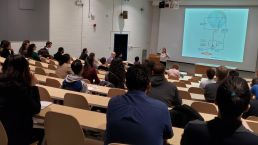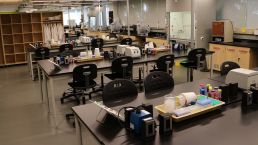CSB Programs
The Department of Cell and Systems Biology offers two core programs: Animal Physiology (Major), Cell & Molecular Biology (Specialist and Major each with the option of Disciplinary Focuses).
We also contribute to multi-Departmental programs (Biology, Bioinformatics & Computational Biology, and Genome Biology).
CSB is also the academic home for the Human Biology program.
CSB is participating in the Arts & Science Internship Program (ASIP), a work-integrated learning program for A&S undergraduate students enrolled in specific programs of study. Students enrolled in eligible CSB programs and entering their second year of study in Fall 2024 can apply to ASIP starting on June 10, 2024. Click here for more information.
Please Contact Us For Help
If you are enrolled in one of the programs that we administer (Animal Physiology, Bioinformatics and Computational Biology, Cell & Molecular Biology or Genome Biology), we strongly recommend that you review your progress in your program(s) regularly on Degree Explorer. If you have any questions or concerns about your CSB program, please contact us and we will be happy to review your program with you.
Answers to Frequently Asked Questions about Programs can be found on our FAQ page. To receive notices regarding any events and opportunities available to undergraduate students, please follow us on our CSB Undergrad Instagram page.
Open Programs

Requirements
- open to all students who have successfully completed at least 4.0 credits in any subject
- no application for entry
- no limit to the number of students that enter the program
Important
Logon to ACORN to enroll in these programs. Enroll in these programs from 3 March to 15 September 2025.
Explore Open Programs
Limited Programs

Requirements
- apply for entry
- limit to the number of students accepted
- see each program for admission requirements
Important
Logon to ACORN to apply for, then enroll in these programs.
- The first round of application for these programs is 3 March to 25 April 2025.
- The second round of application is 5 July to 19 August 2025.
Explore Limited Programs
Disciplinary Focuses

Requirements
- optional
- apply for entry after enrollment in the general Cell & Molecular Biology Major or Specialist
- limited number of students accepted. Each focus organizes restricted numbers of highly motivated students with interest in one of three major areas of cell and molecular biology that match major research topics in our Department.
- requires a minimum grade of 80% in BIO130H1
- if 80% is not earned in 130, you can apply with a minimum grade of 80% in BIO230H1, BIO255H1 or CSB349H1
- a statement of interest is required as part of the application form
- meeting these criteria does not guarantee entry into a focus; it only makes you eligible to apply
Important
- you can only apply to one focus
- follow the application instructions for each focus below
- application deadline: September 8, 2025 (Status in focuses will be announced the week of September 22)
- Once accepted, focus students are required to: 1. complete a subset of related program courses, 2. participate in a learning community for the focus. Most required learning community meetings are held from 4-5pm on Fridays.
- Individual Cell and Systems Biology professors will prioritize focus students for independent research projects (CSB497H1/498Y1/499Y1).








